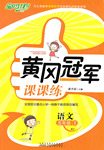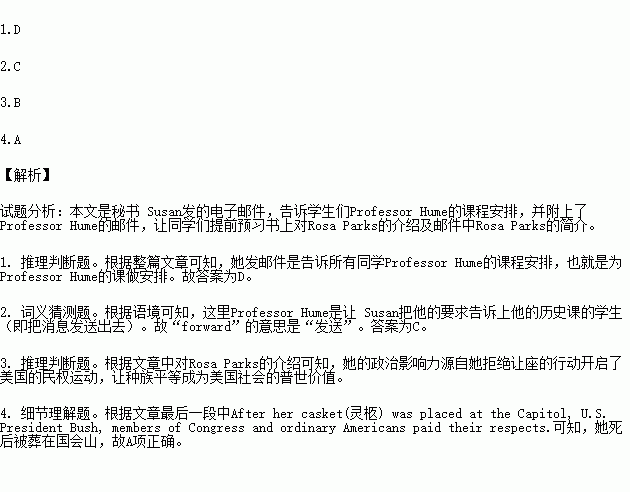题目内容
Dear all,
Please read Professor Hume’s email about his next lecture on Rosa Parks.
Susan Miller
Secretary
_______________________________________________________________________________
_______________________________________________________________________________
_______________________________________________________________________________
_______________________________________________________________________________
_______________________________________________________________________________
Dear Susan,
Please forward this message to students of my history class.
Besides the life story of Rosa Parks in the textbook, the students are also required to read the passage below and some related stories that can be borrowed from the school library.
Ted Hume
The early experiences of Rosa Parks(1913-2005), long known as the “mother of the civil rights movement,” were not different from those of many African-Americans at that time. The black woman, however, turned the course of American history in December 1955 when she refused to give up her seat on a bus to a white man. “By sitting down, ” remarked John Lewis, “She was standing up for all Americans.”
Among the numerous awards Parks received in her life were the Presidential Medal of Freedom(1996) and the Congressional Gold Medal(1999).
Parks died on Oct. 24, 2005. At St. Paul A.M.E. Church in Montgomery, a large crowd including Secretary of State Condoleezza Rice celebrated her life. Rice said she and others, who grew up when the political activities of Parks held public attention, might not have realized her impact on their lives, “but I can honestly say that without Mrs. Parks, I probably would not be standing here as Secretary of State.”
After her casket(灵柩) was placed at the Capitol, U.S. President Bush, members of Congress and ordinary Americans paid their respects. In American history Parks is the first woman to lie in state at the Capitol, a very high regard usually reserved for Presidents of the United States.
1.What is the main purpose of Susan’s email?
A.To introduce to the students Rosa Parks.
B.To help the students organize a lecture.
C.To answer Professor Hume’s last email.
D.To make arrangements for Professor Hume’s class.
2.What does the underlined word “forward” mean?
A.Read.B. Explain.C. Send.D. Take.
3.The political impact of Rosa Parks lies in the fact that she ________.
A.joined the civil rights movement at a young age
B.made racial equality a common value in American society
C.helped Condoleezza Rice achieve political success
D.set a good example in her early life for other black Americans
4.How was Rosa Parks treated after her death?
A.She was honored to lie in state at the Capitol.
B.She was given the Presidential Medal of Freedom.
C.She was received by President Bush at the Capitol.
D.She was named “mother of the civil rights movements.”
 黄冈冠军课课练系列答案
黄冈冠军课课练系列答案
